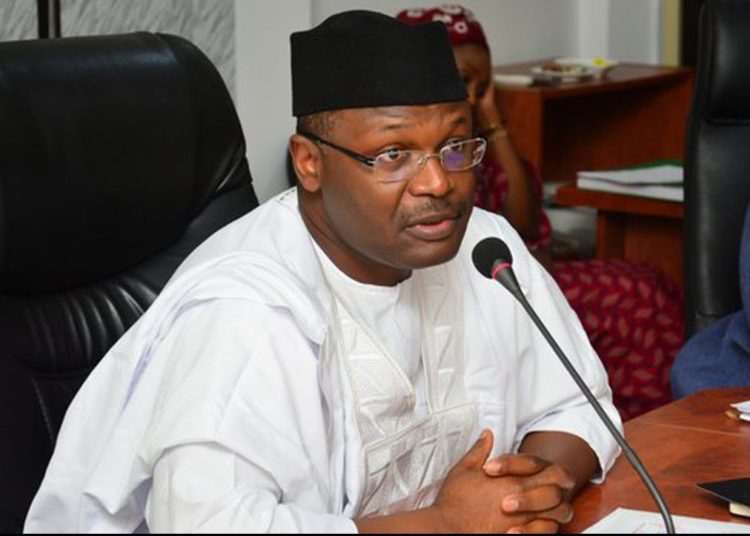Recent happenings arising from the just concluded governorship election in Ekiti state and, before it, the party primaries, especially those of the ruling All Progressives Congress (APC) and the opposition Peoples Democratic Party (PDP), where there were widespread allegations of financial inducement, brings to the fore, the urgent need to conclude all legislative actions on the Electoral Offences Commission Bill.
We recall that the upper chamber of the National Assembly, the Senate, has passed the bill and forwarded it to the lower chamber for concurrence way back in July 2021. Almost one year after, the House of Representatives is yet to pass the bill so that President Muhammadu Buhari can sign it into law.
The bill, when it becomes law, will empower the commission to investigate electoral offences, prosecute electoral offenders and maintain records of all persons investigated and prosecuted. It also prescribes a 20-year jail term for persons found guilty of snatching ballot boxes during elections.
The legislation also proposes that any candidate or agent who damages or snatches ballot boxes, ballot papers or election materials before, during and after an election without the permission of the election official in charge of the polling station, shall be jailed for 20 years or fined N40 million.
The bill, in the considered opinion of this newspaper, has become imperative in view of the Independent National Electoral Commission (INEC’s) inability to prosecute electoral offenders in accordance with the provisions of section 149 and 150(2) of the Electoral Act (as Amended).
There is no contesting the fact that electoral offences remain a major threat to credible, free and fair elections. It is sad that electoral offences including vote buying and ballot box snatching among others are being committed with impunity for the simple reason that the law is blind to them.
Based on this lacuna in the nation’s statute books, experts, including politicians themselves, have raised issues on the urgency of having one in place. It is this understanding that informed the decision of the Justice Muhammadu Uwais- led committee to recommend the establishment of an Electoral Offences Commission to deal with the prosecution and punishment of any electoral infraction.
In our view, having the Commission in place and functional, will no doubt enhance the credibility of the electoral process and contribute immensely to the nation’s drive to have free, fair and credible polls since the provision in the enabling law will serve as a disincentive to those wishing to perpetrate electoral offences. Conscious of this and mindful of the need to put in place the necessary legal machineries, the senate, passed the bill into law.
We are, however, worried that the bill has been at the House of Representatives for almost one year now, without the lawmakers doing the needful as far as its passage is concerned. The lower chamber needs to be reminded that it cannot continue to dilly-dally on a matter that is as important as legislation intended to add value to the democratic endeavour. The continued delay in passing this important legislation could jeopardise the 2023 polls judging by the current trend as witnessed during the party primaries.
We are compelled by the expected impetus that the law will add to the effort to streamline the democratic procedures to urge the House not to trifle with its passage. It may appear, based on the lethargy the House finds fascinating, that its members are not sufficiently attuned to that fact that the time is ripe for it to act and very fast too, on this piece of legislation!
With activities leading to the 2023 polls reaching a crescendo, this newspaper is saddened by the House of Representatives’ seeming lacklustre attitude towards the passage of this important legislation, which without doubt, has the tendency to change the narrative of election in the country.
However, while the House of Representatives continue to foot drag, it is soothing to note that the Inspector-General of Police, Usman Baba, recently announced the establishment of the Electoral Offences Desk (EOD) at the Force Criminal Investigations Department (FCID).
The office is to be supervised from the Force Headquarters in Abuja, with the Commissioner of Police, Force Criminal Investigation Department (FCID), as the Desk Officer, with units at state commands nationwide. While the efforts by the IGP may not be adequate, it is, nevertheless, a step in the right direction and we hope that the police will not abuse it but do all that is necessary to make it work.
The Chairman of INEC, Professor Mahmood Yakubu has, on several occasions, spoken on the need to offload the burden of prosecuting electoral offences from his commission’s shoulders. It is clear that for electoral offenders to be prosecuted in accordance with the provisions of sections 149 and 150(2) of the Electoral Act (as Amended), the Electoral Offences Commission is indispensable.











